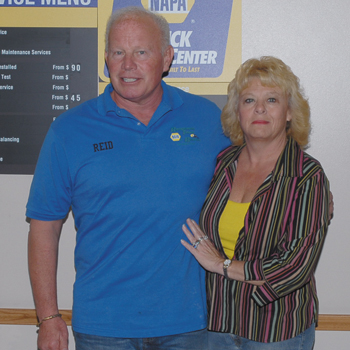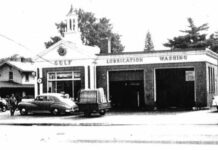By Gary Bulter
NEWPORT, Tenn. — How does a truck repair/freight company reinvent itself and, quite literally, rise from the ashes of a horrific tragedy that would destroy most companies?
Ask Reid Hawley, who, along with his wife, Karen, did just that after one of his drivers was charged with and later convicted of felony death by vehicle following an accident on I-40 on July 1, 2011. Hawley, who nearly lost his business, Commercial Truck Center (CTC), located at 878 W. Highway 25/70 in Newport, Tenn., said the accident was “a knockout punch to our freight company, Hawley Transport Service, Inc., which was struggling anyway from effects of the economic downturn in 2008.
“The troubles we faced were nothing compared to the grief suffered by families of the three people who died in that crash,” said Hawley, “but we had to dig deep and make some hard decisions after it happened.”
Hawley is circumspect about the facts of the horrible accident deemed to have been caused by Ronald Graybeal, of Newport. Graybeal was at the time driving a Freightliner tractor trailer on I-40 in Durham County, N.C., when the truck plowed into a line of vehicles that had come to a stop on the interstate highway, killing the drivers of the three vehicles struck by the 80,000-pound rig. Graybeal was determined to have ingested marijuana and marijuana residue was found in the cab of the truck. As a result, Graybeal was eventually convicted and is now serving 25-to-life in prison.
“I don’t want to hide the fact that this driver was driving while under the influence, even with all the grief it  has caused us, and the loss of our freight business,” said Hawley. “People need to know the dangers of driving while under the influence of any drug or alcohol. People lost their lives because this driver’s reaction time was so slow, and we lost a business that was worth about $2 million per year.”
has caused us, and the loss of our freight business,” said Hawley. “People need to know the dangers of driving while under the influence of any drug or alcohol. People lost their lives because this driver’s reaction time was so slow, and we lost a business that was worth about $2 million per year.”
Hawley said that it is actually an understatement that Graybeal’s reaction time was diminished.
“Troopers and insurance investigators found, through the truck’s on-board ‘black box,’ that Graybeal had not even hit his brakes before striking those vehicles, even though other vehicles had come upon the scene and had been able to slow down and stop,” he said.
Hawley said he wants drivers of all ages, and particularly young drivers, to pay attention to the facts, and not the hype, about marijuana as it relates to driver safety.
“You don’t need studies, although there are plenty of them available, to see that smoking marijuana affects a driver’s judgement and reaction time,” he said. “Just ask the families of the people who died in that terrible accident.”
Hawley also pointed out that if Graybeal had not been found to have been smoking marijuana, he would probably not have even been charged criminally after the accident, although a civil suit would likely have been inevitable.
“But Ronnie Graybeal would probably be a free man today if he had not been using marijuana on the job,” he added.
Hawley said the only thing that kept his company free of liability in the aftermath of the crash was that his company’s truck was found to have met all required safety standards.
“In fact, the truck was pristine, and law enforcement and insurance investigators went over it with a fine tooth comb,” he said. “And we had always made sure that Mr. Graybeal passed all the required drug tests and kept his log books in order. There is no way that we could have anticipated this tragedy.”
Fallout from the crash eventually caused Hawley Transport Service, Inc. to lose all its freight line contracts due to a precipitous drop in the company’s safety rating. Hawley said that the lower safety rating, combined with the already unsteady economy, made keeping the freight line going untenable. As a result, Hawley and his wife and partner, Karen, had to draw upon the company’s cash reserves and lines of credit to stay afloat.
“Had it not been for Fraley & Schilling, of Rushville, Ind., signing on with us to maintain their fleet of trucks, I don’t know if we could have hung on,” he said. “F&S has been a blessing for our company, and allowed us to not only stay afloat but to grow and prosper.”
In addition to F&S, Hawley said CTC has signed up several large fleets for maintenance programs, including Fleet Master, J.B. Hunt, Swift, and several local companies within the immediate service area.
“F&S does fleet work for Bush Bros., and Fleet Master carries for the Ball Corp., and we have exclusive programs with both those companies for their fleets in Northeast Tennessee,” Hawley said.
Smaller local companies that use CTC for their maintenance work include Goode Septic Service, Crowder Excavating, Rafting in the Smokies, Cocke County Gas, Shelton Oil (Waynesville, N.C.), and the C.F. Group.
Hawley said that attracting fleet maintenance programs has brought the company back to within striking distance of the seven figure gross yearly income it had enjoyed before the tragic accident, but he also sought other hedges against economic downturns and unexpected pitfalls.
“Karen and I decided to go into the big-rig wrecker business, particularly to assist our fleet accounts when one of their drivers has an emergency on the road,” he said. “We converted one of our former freight haulers, a Freightliner tractor, into a wrecker using a specialized hydraulic unit manufactured by Jerr-Dan, and I make it available to go to any of the 48 contiguous states. If we get a call from Dallas or Richmond, or just about anywhere, we hook up a good tractor to the wrecker and deliver it to the driver, then return home with his to repair it here.”
Hawley said the wrecker business probably accounts for about 10 percent of his company’s business now.
Other changes which have occurred since 2006, when CTC was first profiled in the Automotive Report, include completion of a 1,000-square-foot office addition, an additional road service truck, and a Jeep to transport diagnostic equipment on site when both road service trucks are in use.
“And we were invited to become one of NAPA’s family of more than 2,000 Truck Service Centers in 2010,” Hawley is proud to point out.
There have been major staffing changes since 2006 as well. Hawley said his former lead mechanic, Jamie Gass, has relocated to Billings, Mont.
“But we are still in close contact. Karen and Jamie’s wife are Facebook friends and we talk to them frequently,” he said.
Taking over the position vacated by Gass is Ken Smelcer, who Hawley said is a well-seasoned master technician.
“Ken is not only a top-notch master technician, but he is all an employer could ask for in terms of courtesy, professionalism, and a willingness to go the extra mile to get a customer what he needs in the shortest amount of time,” he said. “And we now have James Ricker and Eli Brown on board, as well as Mark Wood, our technical ‘guru.’”
Hawley said that one of the company’s key assets is not even an employee but has worked with CTC hand-in-hand since the company was founded in 2003.
“Sam Gentry is Freightliner of Knoxville’s Master Technician, and he has made himself available to us through the good times and the bad,” he said. “We were exclusive with Freightliner during the time we had our freight line, and that is unusual for a freight line with less than 50 trucks, and we only had about 10. And they even let us do our own warranty work.
“Sam is still our go-to guy, I don’t know what we’d do without him,” added Hawley. “He could be up to his elbows in grease, but he would stop what he was doing to give us guidance when we were stumped. If Mark [Wood] is our in-house technical guru, then Sam is our off-site guru,” he said.
Asked whether the grief, anxiety, and hard work of rebuilding the company from its foundation up has been worth the price, Hawley is unequivocal.
“Absolutely,” he said. “Karen and I have made a commitment to this area and to our customers. We sold our house in Greene County this year and are building a new one on some lake property nearby that we have had for a while. We are here to stay.” •



